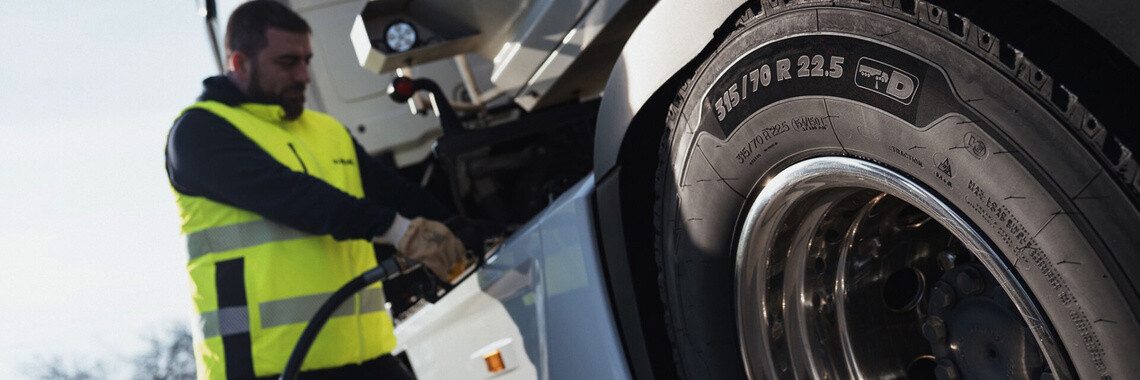
00 quick tips to boost fleet fuel efficiency to lower your tco
In today’s uncertain economic climate, the rising cost of fuel has become a major concern to fleet owners. It tops the list of operating costs that contribute to a truck’s total cost of ownership and can also be tricky to get under control. We sat down with Łukasz Elmanowski, Transport Director at Alegre, a Michelin customer in Poland, to gather his top tips for improving fleet fuel efficiency.

01 łukasz elmanowski gives us tips in order to maximise cost in fleet fuel efficiency
Łukasz Elmanowski, Transport Director at Alegre in Poland.
Introduction
Fleet fuel efficiency can seem like a daunting challenge given the persistent rise in fuel prices ౼ with many factors to consider and few concrete actions to put into place. What behaviours or practices drive up fuel consumption and what can be done to save fuel? We’ve got some expert insight from a fleet manager to share and clear steps to take to help improve your fuel management.
Could you tell us which factors impact fleet fuel efficiency the most?
Łukasz Elmanowski: First of all, we can’t ignore road-related fuel efficiency factors such as weather conditions, accidents and collisions. But on top of these unavoidable factors, the behaviour of truck drivers themselves can significantly impact a fleet’s fuel efficiency, which is an important factor in the total cost of ownership. For instance, when truck drivers are distracted, they tend to drive too close to the vehicle ahead, often fail to anticipate traffic situations and tend not to take advantage of the vehicle systems intended to save fuel.
What would be the optimal scenario for fleet fuel efficiency?
Łukasz Elmanowski: Maintaining an adequate distance between vehicles, being aware of driving conditions and setting the cruise control to 85 km/h on the highway is the surest way to lower fuel consumption.
These behaviours reduce the need to frequently brake and restart, which generates a huge dip in fuel efficiency ౼ especially with a full load. Truck drivers should also
plan their routes ahead of time ౼ which reduces fuel consumption, by saving time and improving driving conditions.
How can fleet managers teach fuel efficiency driving techniques?
Łukasz Elmanowski: There are several options. For instance, at Alegre Transport:
• We have a full-time position dedicated to training our employees in eco driving practices. This person regularly monitors fuel consumption and investigates any significant differences.
• We also incentivise our teams with a Financial Fuel Bonus, awarded to those who fall below the fuel consumption targets we set.
• One of our most fuel-efficient team members was invited to participate in Volvo Trucks’ 6-month test of the latest I-Save engine in Europe, which uses turbo compound technology. He out-performed all the other companies and individuals who participated! Following the test, we purchased the truck and let him select additional options such as alloy wheels and leather seats…to reward him!
Download the 6 Golden Rules poster for fuel savings. Post it within your facilities or hand it out to your drivers to encourage eco-driving habits!
Are there specific tools or educational programmes to help truck drivers adopt fuel efficient habits?
Łukasz Elmanowski: Eco-driving programmes to teach the best driving behaviour is definitely the way to go to maximise fleet fuel efficiency! Once drivers understand the concept of eco-driving, they should familiarise themselves with every feature of the truck, for example, correctly programming the cruise control. Then, they can apply what they learned while accompanied by the driver trainer who can correct mistakes and give tips in real time.
Are there any emerging technological innovations that can improve fleet fuel management?
Łukasz Elmanowski: Yes, recent Volvo trucks are, for example, equipped with the I-See system, which shows the topography of the terrain, allowing our fleets to adapt speed or gears accordingly. Most of our trucks are also equipped with the new generation I-Save engines, which can boost fuel savings by about 10%!1
And in terms of tyres, what features impact fleet fuel efficiency?
Łukasz Elmanowski: First of all, it is incredibly important to select tyres based on your company’s specific line of work. Some tyres suit firms with consistent loading/unloading and motorway travel, while others are ideal for those transporting goods to/from construction sites. For our use cases, we chose MICHELIN’s X® Multi Energy range! With these tyres we not only achieve decent results in terms of fuel efficiency, but we can log at least two hundreds of thousands of kilometres before needing to replace a tyre.
Any recent tyre innovations that could improve the fleet's fuel efficiency?
Łukasz Elmanowski: Yes, at Alegre Transport we introduced in collaboration with Michelin the Tyrecheck system, which monitors relevant tyre data via an app ౼ such as tread depth and pressure - and helps us, through its indications, minimise the risk of tyre damage, reduce fuel consumption and, above all, extend the life of our tyres!
Can you share some tyre maintenance practices that maximise fleet fuel efficiency?
Of course, the four key maintenance practices that can have a significant impact on a fleet's fuel efficiency are:
-
• Maintaining a timely tyre rotation schedule
-
• Turning tyres on the rim
-
• Swapping tyres from side to side on the tractor
To conclude, any general advice for fleet owners looking to reduce fuel consumption?
Łukasz Elmanowski: I believe that achieving fleet fuel efficiency requires a willingness to constantly strive for better results, on the part of both the individual and fleet managers. This can be facilitated by training, telematics devices or fleet fuel management systems that provide trip reports and monitor parameters, but it all starts with the will.

gettyimages 930571046
car going fast on a road by night







